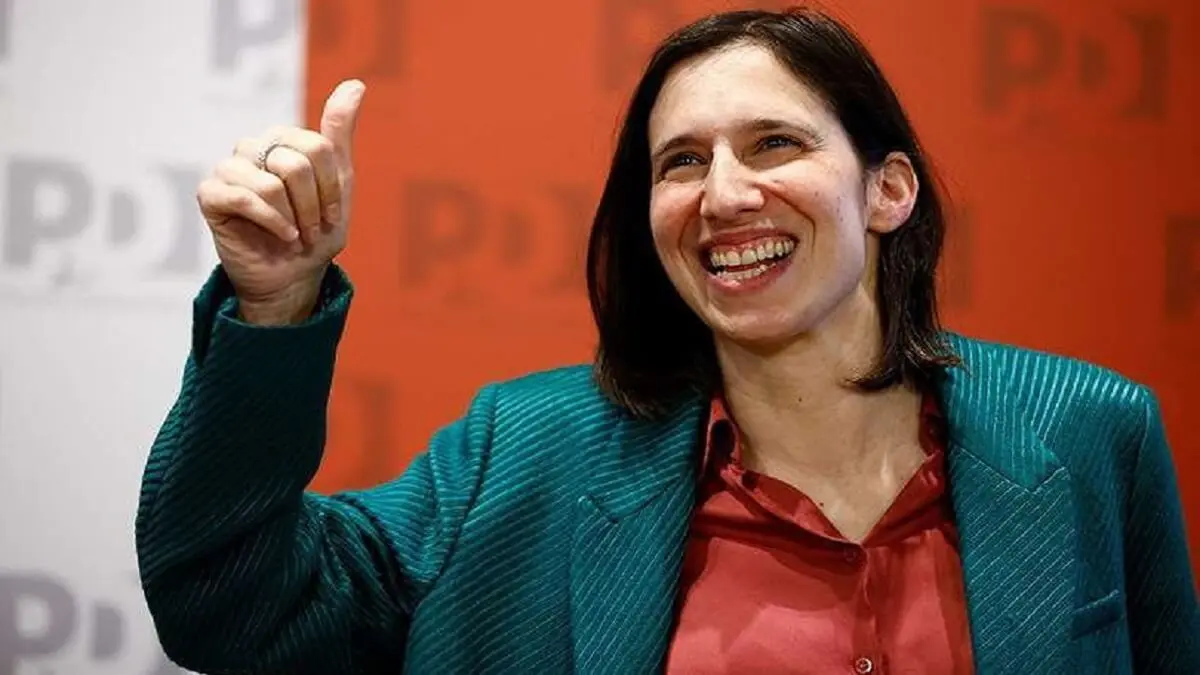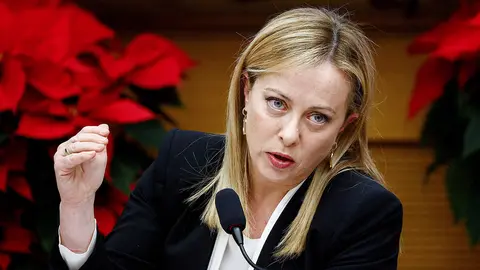Ely Schlein and the difficulties of governing the Democratic Party (DP)

The administrative elections that have just taken place have highlighted the difficulties that the new leader, Ely Schlein, will face if she does not change course within her party. Since her unexpected victory at the end of February this year, the young politician from Bologna has been criticised by various sectors of her party. And the most striking thing is that she probably has little to do with her party's defeat in this year's administrative elections, since it is well known that in local elections people vote much more for the person than for a party or a particular acronym: considering that she has only been at the head of the PD for three months, Schlein has had little room for manoeuvre in drawing up the electoral lists. What she is learning "the hard way" is the difficulty of governing a party as heterogeneous as the PD and with secretaries general who, whatever their background, are immediately questioned.
In Schlein's case, the main problem is that she has been the "il rottamatore" that Matteo Renzi was not really at the time, however much he liked to make himself known as such. In effect, the party's "old guard" has been unceremoniously liquidated, ignoring the fact that it is this same "old guard", through its famous "currents", that really controls the party apparatus. Surely more than one will wonder why Schlein has been so quickly questioned, while this was not the case with Matteo Renzi. And there are answers to all this.
The first answer is that Renzi found the left of his party at a very low ebb after the debacle experienced in the previous months by the person who had led it (Pierluigi Bersani). It is true that, with Bersani as head of the ticket, the Democratic Party (PD) had won a general election for the first time, those held in February 2013. But the election of a new president of the Republic (at the end of the mandate of the head of state, Napolitano) and Bersani's inability to see that he could only put forward his candidate on the basis of a pact with a centre-right that had been less than a point behind in those elections, led to the blocking of the presidential election; to Bersani's resignation as secretary general; and his replacement by the now deceased Gugliemo Epifani, interim secretary general until the holding of new primaries in December of that year. In those primaries, Matteo Renzi, then mayor of Florence, but already well known in his party because he had lost the previous ones to Bersani, swept the board with 70% of the votes and with a very high turnout of militants. In contrast, Schlein beat the party apparatus candidate (his mentor Bonaccini) by less than 10 points and with a turnout of just over 900,000 people.
The second answer is that Renzi, whom many were slow to discover was a Christian Democrat in the guise of a socialist, moved quickly to negotiate with the centre-right and, after forging the "Pact of the Nazarene", was already president of the Council of Ministers in February of the following year. Of course, Renzi took great care to put the leaders of the party's currents at the head of important ministries, thus ensuring that rather than a 'Renzi government', it was a 'centre-left government', at least in terms of the names in the executive.
The third answer is that Renzi faced a weakened centre-right: Forza Italia had regained momentum, but the other centre-right parties (led for two decades by Gianfranco Fini and Umberto Bossi) had new leaders, with a Salvini who for years had been pushed into a corner by both Bossi and the late Roberto Maroni, and a Meloni who benefited from the fall of his mentor Fini, but who had a party with everything to do.
In any case, Schlein has a major underlying problem, and that is the fact that the country is ageing fast: 51 million of the 60 million inhabitants are over the age of 18, and for the first time fewer than 400,000 people have been born in a year. This makes Transalpine society conservative by nature, as any ageing society is, and nothing better to remember than what happened in the last two general elections: in the March 2018 elections, the centre-right won 37% of the vote; and in the September 2022 elections, this figure rose to 42%, giving it the governability of the country. The fact is that the young people to whom Schlein directs his radical rhetoric are having less and less influence at the ballot box, in the face of a population that is increasingly passive and, on the other hand, has a strong voting culture.
What is certain is that Schlein still has a lot of room for reaction. In the coming months there will be elections for the government of some regions, but none of them really important: in terms of both economic weight and population, Lombardy just held its elections a few months ago, while Veneto and Emilia-Romagna renewed their respective governments in 2020. In reality, the 'moment of truth' for Schlein's leadership will come in May 2024, when elections to the European Parliament are held: in other words, the first national elections since Schlein became PD secretary general.
What is clear at the moment, however, is that Schlein is making the same mistakes as the last PD primary winner, none other than the current MP and former governor of the Lazio region, Nicola Zingaretti. Elected with 65% of the vote in March 2019, Zingaretti left the PD General Secretariat two years later without many knowing of his existence. And the fact is that he was only really seen in the negotiation of the Five Star-PD government that took place in August-September 2019: unlike Bersani (let alone Renzi), he did not go to the media, something fundamental nowadays when a new leader (in this case, Schlein) must make himself known to potential voters.
It should be remembered that Ely Schlein, not being part of the current Executive or presiding over the government of any region, limits his public presence to Parliament and the PD's closest newspaper ("La Repubblica"). This may have consequences. In the 2019 European Parliament elections, Zingaretti only managed to increase his party's direct vote by four percentage points compared to Matteo Renzi's debacle in March 2018, but Zingaretti's possible excuse was that he had won the PD's general secretariat only two months earlier. On the other hand, Schlein, who comes with the problem of having won by the slimmest of margins over his rival Bonaccini (and also in the primaries with the lowest turnout since the Democratic Party was founded), has a unique opportunity to consolidate his leadership in these European elections. Because surely by that time her direct competitor, who is none other than the current President of the Council of Ministers (Meloni) will feel the consequences, not only of having been at the head of the Executive for a year and a half (a whole world in transalpine politics), but also the not exactly favourable reaction to some General State Budgets (those for the year 2024) necessarily limited in public spending, since the Stability and Growth Pact is now being reactivated. A pact which, let us remember, establishes that national debt as a percentage of GDP must be at 60%, when the eurozone's third largest economy closed 2022 at 154%.
It is true that Meloni, like the rest of the southern European countries, managed to get Germany and its supporters in the centre and north of the European Union to make the application of the Stability and Growth Pact flexible, avoiding the much-feared austerity of 2010-14. But it is no less certain that the most indebted members of the Union have committed to balancing their public accounts, and that this will lead to a contraction of government spending that is sure to meet with a very mixed response.
It will then be the perfect moment for Schlein to make a stand, reaffirming the importance of social policies that she knows her party must defend with particular force. By that time, the young politician from Emilia-Romagna will have been at the helm of the PD's General Secretariat long enough to reverse polls that, at the moment, continue to give the centre-right a big advantage over the centre-left as a whole. And one of her main problems is that the flight of parliamentarians to other parties may already have been very significant at that time, giving an image of division within her party that would be very damaging to her. However, if she manages to withstand the challenge, she could begin a very successful period within this party, as the leaders of the main currents have the problem of being increasingly burdened with years.
We will see how this young and talented politician develops, but it is certain that she has not got off to a good start at the head of a party as traditionally fratricidal as the PD. She has surrounded herself with a new generation that will be loyal to her as long as the polls, firstly, and the various elections, later on, show growth. But it is equally true that the risks she is taking may end up being decisive for a short-lived general secretary of the party. In any case, Schlein is already beginning to know what it's like in the PD: she only has to talk to Pierluigi Bersani or Matteo Renzi to know what it's like to have an "internal war" within your party. Will the PD emerge from this dynamic once and for all, or are we walking towards the end of this party? Time will tell.
Pablo Martín de Santa Olalla Saludes is a lecturer at the Camilo José Cela University (UCJC) and author of the book "Historia de la Italia republicana" (Sílex Ediciones, 2021).


